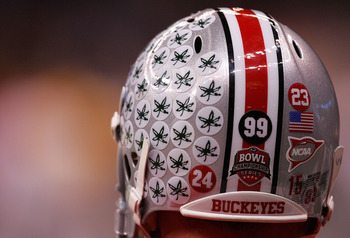The ongoing controversy centered on the New Orleans Saints about the so-called bounties being offered by NFL players as a sort of performance bonus for hard hits, including those that diminish an opponent's ability to play the game is all a bit rich for me. Let us not forget that football is an intensely physical sport in which the physical domination of the other team in an effort to score points is the main point of the game.
There is a big difference between playing dirty and providing incentives for playing well within the rules. Former New York Jets linebacker Bart Scott told the New York Times:
"Knocking someone out doesn’t mean you’re doing something dirty. It’s no different than when the Detroit Pistons played Michael Jordan and every time he went to the hole, they were physical with him. No one was literally trying to hurt him."Former Denver Bronco Trevor Pryce said something similar:
"A big hit is different. Getting rewarded for a big hit, they do that in college. You get a sticker on your helmet.”We can chalk that up to another instance of college players not getting proper compensation in a pseudo-professional sport, but I digress.
If a team had a bounty system was for touchdowns scored or long punt returns, we wouldn't be having this debate. It is only because the bounty systems involves defensive players doing what defensive players do -- hitting people really hard -- that there is the veneer of faux outrage coming from the commentariat.
In recent years, the NFL has cracked down on certain hard hits, especially those involving the head and which result in concussions. In doing so they are taking some of the raw brutality out of the game, which is a response to both modern sensitivities and the risks of legal liability from players exposed to serious injuries.
But make no mistake -- the game is brutal. Legendary running back Tony Dorsett explains:
"If it was me, and I'm a defensive player, and I'm playing against the Dallas Cowboys, and Tony Dorsett happens to be one of their best players, it would be to our best advantage to get him out of the game. If it's within the rules of tackling and contact, so be it. I don't think it's that big of a deal. … They're not telling a guy to mangle somebody or kill somebody. It's 'Get him out of the game.' "The WSJ has done a nice job cutting through the rhetoric to explore what it is we are really talking about here by doing an empirical investigation of game films from the New Orleans Saints to catalog their track record of defensive hits that led to a player leave the field injured. What did they find? Well, not very much:
A Wall Street Journal review of every regular- and postseason Saints game since 2009 makes clear what the NFL report didn't: Seldom did a Saints-inflicted injury force an opponent to leave the field.While it would be useful to compare the Saints with other teams, seeing an injured player leave once every 3 games does not seem unusual for NFL football, where on-field injuries are otherwise known as commercial breaks. The WSJ continues:
In 48 regular-season and six postseason games, such incidents occurred only 18 times. The Saints player involved in the largest number of those cases was safety Roman Harper. That number was four.
According to the NFL, the Saints rewarded players $1,000 for knocking opponents out of the game and $1,500 if the player had to be taken off in a cart. Exactly who received what on the Saints roster isn't clear, including whether Harper received any money at all. But under that formula, the total payout during those three seasons would have been about $19,000. And of that, based on the review of those seasons, Harper could have pocketed a grand total of about $4,500—peanuts for a player earning more than $7 million a year.Forgotten it seems is that a defensive player like Harper is paid $7 million per year because he has a rare talent in being able to physically dominate opposing players. That obscene salary is the real bounty. To think that he (or anyone else) is going to risk their base salary via suspension or the on-field wrath of his peers by playing dirty (see the trials and tribulations of Ndamukong Suh) in order to make a few thousand dollars need a primer on basic economics.
The bounty scandal is not a scandal at all. What we have here is a sport that is based on physical contact which is being administered by people who are increasingly sensitive to the images and values that are projected by the sport. Those sensitivities are a good thing and NFL football is not alone -- rugby, ice hockey, boxing (and its variants), various Olympic sports like wrestling and judo and lacrosse all involve some form of physical domination by one person of another.
The NFL would be well served by focusing attention on what really matters here, which is the rules they have in place governing the impressive spectacle that they put out on the field. Focusing attention on "bounties" is a distraction and an insult to fans and players alike.



No comments:
Post a Comment